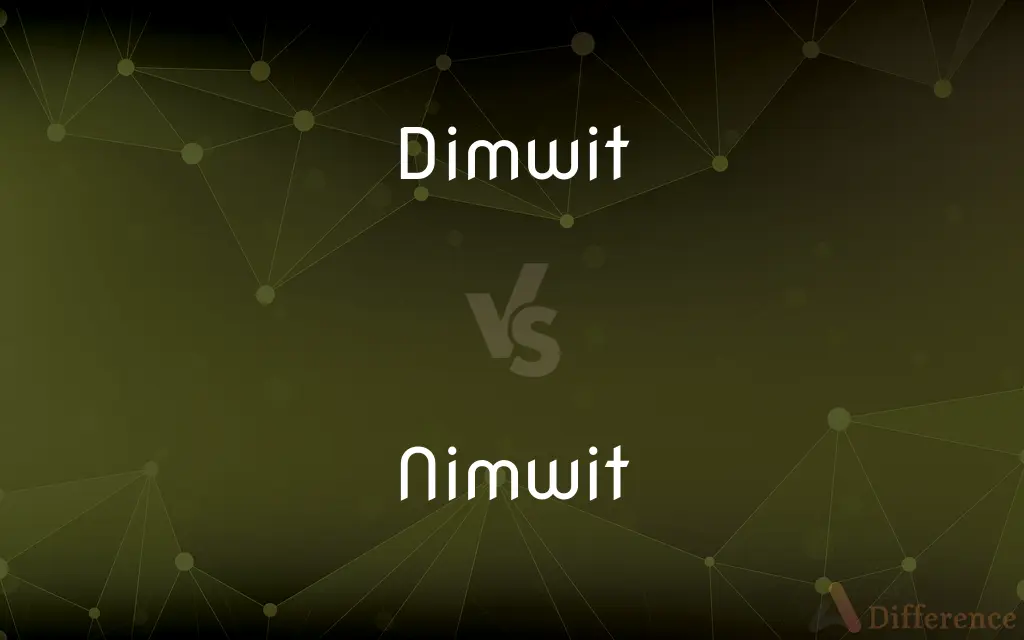Dimwit vs. Nimwit — What's the Difference?
Edited by Tayyaba Rehman — By Fiza Rafique — Updated on April 3, 2024
Dimwit signifies someone lacking intelligence or wit, while nimwit is a less common variant of "dimwit," often used interchangeably.

Difference Between Dimwit and Nimwit
Table of Contents
ADVERTISEMENT
Key Differences
Dimwit is a derogatory term that denotes an individual perceived to have limited intelligence or poor judgement. Whereas nimwit, though less commonly used, essentially carries the same connotation and is often seen as a playful or less harsh variant of "dimwit."
The origin of "dimwit" traces back to early 20th-century slang, combining "dim" (suggesting dullness or lack of brightness) with "wit" (referring to mental sharpness), thus highlighting a deficiency in intellectual acuity. On the other hand, "nimwit" is a variant that emerged from the original term, possibly as a result of playful linguistic evolution, and lacks a distinct etymology or separate usage context.
In terms of usage, "dimwit" is widely recognized and understood in English-speaking communities, making it a more impactful choice when expressing frustration or criticism about someone's intellectual capabilities. Nimwit, by contrast, may be used in similar contexts but could be perceived as less familiar or even confusing to some audiences, given its less frequent use.
Despite their derogatory nature, both terms can be found in informal communication, such as in humorous exchanges among friends or in fictional works to describe characters in a lighthearted manner. It's important to note that the use of either term in serious discourse is generally considered disrespectful and could be offensive.
The choice between using "dimwit" and "nimwit" might also reflect the speaker's desire for linguistic variety or a preference for euphony, with "nimwit" offering a slightly softer sound that might be seen as less direct or severe than "dimwit."
ADVERTISEMENT
Comparison Chart
Meaning
A person perceived as lacking intelligence.
A variant of "dimwit," similarly indicating low intelligence.
Connotation
Derogatory, widely recognized.
Playful, less common.
Usage Context
Broadly used in informal and humorous contexts.
Less frequently used, potentially causing confusion.
Origin
Early 20th century, from "dim" + "wit."
Variant of "dimwit," lacking a distinct etymology.
Perception
Considered direct and potentially harsh.
Seen as a softer or less direct alternative to "dimwit."
Compare with Definitions
Dimwit
A person with limited intelligence or judgement.
The character in the play was such a dimwit, always missing the obvious clues.
Nimwit
Essentially the same as "dimwit," indicating a person of perceived low intelligence.
That nimwit decision cost the team the game.
Dimwit
Used to describe someone who makes foolish decisions.
Leaving the keys in the car was a real dimwit move.
Nimwit
An endearing term for a person acting foolishly in a specific instance.
You forgot your own birthday, you silly nimwit!
Dimwit
Someone perceived as intellectually inferior.
Despite being called a dimwit, she proved them all wrong with her brilliant invention.
Nimwit
A playful insult referring to someone's foolishness.
Oh, you nimwit, you sent the email to the wrong person!
Dimwit
Reflecting a lack of quick-wittedness or sharpness.
He's no dimwit; he just doesn't apply himself.
Nimwit
Used to describe an action or decision lacking wisdom.
Taking a shortcut through the forest at night was a nimwit move.
Dimwit
A term indicating slow mental processing.
The dimwit of the group, he was always a few steps behind in the conversation.
Nimwit
An alternative to "dimwit" with a less harsh sound.
He might act like a nimwit at times, but he's actually quite clever.
Dimwit
A stupid or silly person.
Nimwit
(rare) A dimwit.
Dimwit
A stupid person.
Dimwit
(pejorative) A person who is deficient in intelligence.
Dimwit
A stupid incompetent person
Common Curiosities
Is it offensive to call someone a dimwit?
It can be considered disrespectful and offensive, especially in serious contexts.
Which term is more commonly used, dimwit or nimwit?
Dimwit is more widely recognized and used than nimwit.
How is nimwit different from dimwit?
Nimwit is essentially a less common, playful variant of dimwit with similar meaning.
Can nimwit be used affectionately?
Yes, depending on context, it can be used in a more affectionate or less harsh manner.
Can the term dimwit have a playful connotation?
Yes, among friends or in certain informal contexts, it can be used playfully.
What does dimwit mean?
Dimwit refers to someone considered to have limited intelligence or judgement.
What's the origin of the term dimwit?
It originates from early 20th-century slang, combining "dim" (lack of brightness) with "wit" (intellectual sharpness).
Can nimwit be considered a euphemism for dimwit?
Yes, to some extent, due to its softer sound and less frequent use.
Do dimwit and nimwit imply a permanent state?
Not necessarily; they often refer to behavior in specific situations rather than a fixed trait.
Is there a polite alternative to calling someone a dimwit or nimwit?
Instead of using derogatory terms, addressing the specific behavior or decision directly is more respectful.
In what context might one prefer to use nimwit over dimwit?
In a more lighthearted, playful context where the intention is not to harshly criticize.
Are there any contexts where dimwit or nimwit should be avoided?
Yes, in formal or serious discussions, or when the aim is to maintain respect and politeness.
Is nimwit a recognized word in dictionaries?
It might not be widely recognized in formal dictionaries due to its less common usage.
How should one respond if called a dimwit or nimwit?
Context matters; it could be meant in jest, but if it's offensive, addressing it calmly is advisable.
How have the uses of dimwit and nimwit evolved over time?
While their core meanings remain, usage contexts have broadened to include more playful and less offensive situations.
Share Your Discovery

Previous Comparison
Embetter vs. Embitter
Next Comparison
Reticent vs. TaciturnAuthor Spotlight
Written by
Fiza RafiqueFiza Rafique is a skilled content writer at AskDifference.com, where she meticulously refines and enhances written pieces. Drawing from her vast editorial expertise, Fiza ensures clarity, accuracy, and precision in every article. Passionate about language, she continually seeks to elevate the quality of content for readers worldwide.
Edited by
Tayyaba RehmanTayyaba Rehman is a distinguished writer, currently serving as a primary contributor to askdifference.com. As a researcher in semantics and etymology, Tayyaba's passion for the complexity of languages and their distinctions has found a perfect home on the platform. Tayyaba delves into the intricacies of language, distinguishing between commonly confused words and phrases, thereby providing clarity for readers worldwide.















































